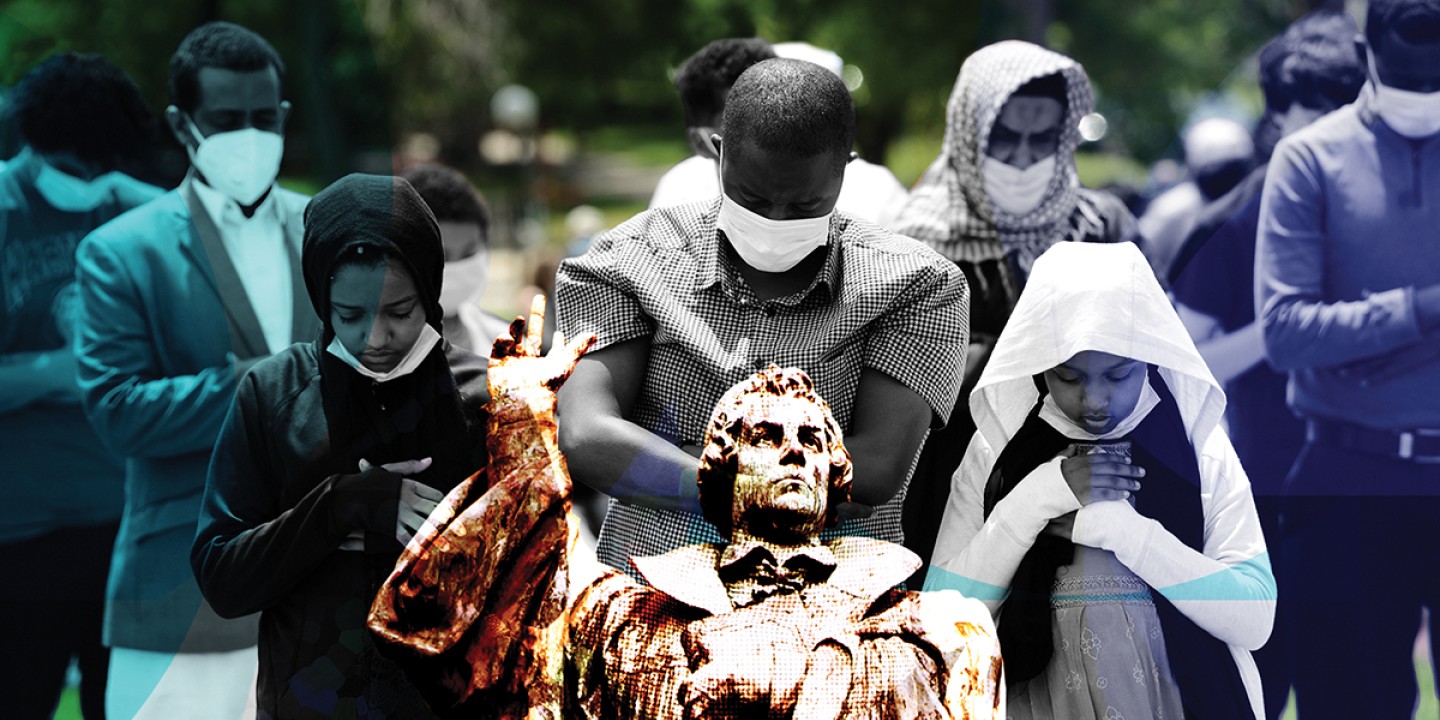In declaring whose lives matter, Martin Luther failed his own idolatry test
When it comes to racism, we’re failing it too.

Five hundred years ago, Martin Luther rebelled against a religious system that in his view forced people to worry constantly about their worth before God. In an age when sudden death was common and few people questioned the reality of an afterlife, Christians were told that eternal damnation awaited them unless they confessed to the proper authorities—ordained clergy—so they could be absolved of any mortal sin before their death. Those who sought absolution were admonished to perform works of satisfaction to reduce their anticipated time in purgatory. The purchase of indulgences counted as one such work. This system was backed by compelling theology and embodied in concrete hierarchical institutions with authority structures. The clergy claimed the authority, designated by God, to determine the ultimate worth of lives.
Luther rebelled against this system because he felt crushed by it; he knew that he could not be worthy before God. Although he belonged to the system’s elite—the spiritual class of monks, mendicants, and clergy that claimed particular merit before God and authority over other human beings—his anxiety about his eternal destiny propelled him to be a champion for others. He discovered and proclaimed the gospel that eternal salvation does not require our own worthiness, only trust that Christ is “our worth.”
Read our latest issue or browse back issues.
One may disagree with Luther’s theology or his assessment of pre-Reformation Christianity. Scholars recognize that there were diverse medieval traditions and diverse experiences of the 16th-century ecclesial system. But for now, I want to think about the present through Luther’s theological assessment of his age, and vice versa.
As in the 16th century, there are systems today that structure life so pervasively and intrusively that few but the oppressed can see these systems as anything but naturally or divinely ordained. Within these systems, there are designated authorities who pass judgment on others’ worth according to the standards they define and the prejudices they hold.
Back then it was the clergy awarding or denying the right to live eternally; today, we have law enforcement and armed vigilantes denying others the right to live here and now. There is a racial hierarchy in America, and among those at the top many cling to the myth that their hard work has won their privilege—not their skin color, not a history of slavery and segregation. Other white Americans know better and yet operate as if the demon of racism did not lie behind the secular idolatry of “success through merit.”
In Luther’s teaching that Christ alone is our worth, he employs a profound understanding of idolatry, unfolded most poignantly in his explanation of the first commandment in the Large Catechism (1529): “A ‘god’ is the term for that to which we are to look for all good and in which we are to find refuge in all need. Therefore, to have a god is nothing else than to trust and believe in that one with your whole heart.” Luther hears God saying in the first commandment, “Whatever good thing you lack, look to me for it and seek it from me, and whenever you suffer misfortune and distress, crawl to me and cling to me.”
Luther named many false gods of his day—learning, wisdom, power, prestige, family, honor—but above all he named mammon and the presumption that Christians can earn salvation by works. Each of these idols remains in today’s world. But the deaths of Ahmaud Arbery, Breonna Taylor, George Floyd, and Elijah McClain, among so many others, remind us that we are in the grips of not just idolatry but an idolatrous system. This system is built on false human standards of worth and enforced by people who have the power over life and death based on their decisions about how those standards are achieved.
Some might resist the use of theological language to describe our sociopolitical system, since the latter does not promise eternal salvation. However, in Luther’s understanding, the stance of Christians toward earthly systems can indeed be idolatrous in the fullest sense of the word: we rely on shallow offers of temporal security because we do not trust in God alone as our eternal creator and redeemer. Further, since our sociopolitical life involves trust in institutions and ideologies, it can readily be subjected to analysis on Luther’s terms. How much suffering do we inflict because we look for a false salvation in our systems—a vision of salvation as wealth and power that is possible only for a few—rather than seeking the best achievable life together?
If we want to think through our current situation and imagine solutions with Luther, however, we also have to acknowledge how he failed in dealing with the people who were most hated and marginalized in his own world: the Jews.
For centuries before Luther, European Jews were subjected to harassment, discrimination, and marginalization. They were falsely accused of vile conduct (such as poisoning wells and ritually murdering Christian children, among other things). They faced the threat of mob violence and the prospect of sham justice should they be charged with a crime by good Christian folk.
From the perspective of governing authorities, Jews served needed economic functions (including moneylending)—but they could be expelled whenever convenient, with all their property seized. By Luther’s day, Jews had been expelled from most of Europe’s larger polities, including England, France, and Spain. They’d found temporary refuge within some realms of the fragmented Holy Roman Empire (present-day Germany), including in Mansfeld, Luther’s hometown, but not in Saxony, where Luther lived most all his adult life.
In the first years of his career as a reformer, Luther argued for Christians to engage in friendly social interaction and discussion of religious matters with their Jewish neighbors. He suggested that if Christians treated the Jews kindly, at least some Jews might convert to Christianity.
But few Jews converted, and in the final decade of his life, Luther became a proponent of abuse and expulsion of Jewish people. If rulers were unwilling to expel the Jews, Luther advised, they should at least burn their synagogues and homes, forbid rabbis to teach on penalty of death, and subject young Jews to forced labor. The Jews had failed the test for worth under Luther’s system.
But it was really Luther who failed. Why did he fail? His own theology helps with a diagnosis: behind colossal religious failure there is idolatry, the worship of a god other than God.
Throughout his career, Luther was preoccupied with people’s resistance to the gospel. He believed that the proclamation of the gospel (the message of salvation by Christ alone) is a vehicle for the Holy Spirit, who comes through the spoken word to create faith. This faith is personal: it’s characterized by the conviction that Christ suffered and rose again not only for those worthy ones who earn salvation, but also “for me” or “for us.”
Within this theological understanding, resistance to proclamation was hard to explain. Luther believed that if truth was spoken, resistance to it could not be blamed on God or even on the messenger. That left the hearer to blame, and Luther identified the chief obstacle as pride in one’s own ability to earn salvation. There was no one more prideful than the Jews, Luther decided; after all, Jews idolized their own status as chosen people.
The idols that fueled Luther’s hatred are numerous. He looked to the results of proclamation rather than trusting in God. His interest in friendly exchange with Jews was contingent on their eventual conversion. He expected Jews to learn from Christian exegesis of Jewish sacred texts rather than bring their own interpretations to the table. And like virtually all people of his time and place, Luther idolized the myth of unified Christian society.
In addition to all this, however, we must say that Luther failed because, unlike earlier in his career, he ceased to identify with those who were harmed by the system. Their existential plight was not his own.
Luther’s relationship to the Jews has fascinated scholars, both because of the profound guilt borne by German Lutheranism for the destruction of European Jews and their culture by the Third Reich and because of the severity of Luther’s about-face. In the late 1510s and early 1520s, his ability to sympathize with Jews to some extent was unusual for a churchman. His later proposals also stood out as exceptional in his context—this time, for their cruelty.
Meanwhile, Luther had very little interaction with Jewish people. Even his abstract proposal for friendly discussion never led to him actually welcoming a Jewish voice.
In today’s environment, there have been genuine acts of solidarity on the part of white Christians and church leaders with black communities that are hurting. Many white people, Christian and otherwise, have joined recent protests against racism and police violence. There have also been many statements of solidarity from church circles. Churches, judicatories, and seminaries have named their commitment to combating racism within their own institutions. They’ve vowed to model a better way for society as a whole.
But there is still the haunting question: Are black voices really being heard? Are they ringing out in predominantly white congregations? Are they invited to occupy pulpits and placed at the center of educational offerings?
Are black people welcomed to speak and be heard, or are they expected to accept someone else’s definition of their cause? Is there sustained conversation and communion across racial divides? How many white Christians see their black neighbors as people created in the image of God—the very image that, in its most perfect form, became incarnate in Jesus Christ? How many white Christians see Christ crucified in the bodies of lynched and murdered black men and women?
If we take Luther as a cautionary tale, we must remember that by the standard of his own understanding of idolatry, he failed. He failed because he idolized his own expectations, and his idolatry was likely fueled by his lack of any genuine social communion with Jews.
Many predominantly white church communities have not taken the first step toward overcoming our own idolatry: genuine hearing across racial lines. Listening to black voices in predominantly white spaces is necessary if we’re going to yield solidarity and action for political reform even when it’s against our immediate self-interest. Even well-meaning attempts to refocus our rallying cries from “black lives matter” to “justice for all”—to say nothing of the petulant dismissal usually involved with the mantra “all lives matter”—miss the point that white racism continues to dehumanize black Americans to the extent that it is existentially necessary to say “black lives matter” in any voice that can be heard. People must be able to say “our lives matter” and “my life matters”—in the presence of the idolaters who are denying the worth of their lives through word, deed, and inaction.
In Luther’s perspective, the heart of faith is confidence that Christ is for me and for us, without any preconditions other than that God has called us. Since the church is the body of Christ incarnate in history, every Christian should also be able to know that other Christians are for them, too. Do black Christians know this of white Christians?
This is not the time to engage in a process of listening before acting in solidarity. White Christians must instead act while listening. We must stand behind, learn from, and be led to the future by our black brothers and sisters. Idolatrous systems are seldom recognized except by those who suffer in their grips.
A version of this article appears in the print edition under the title “Luther’s idols and ours.”





